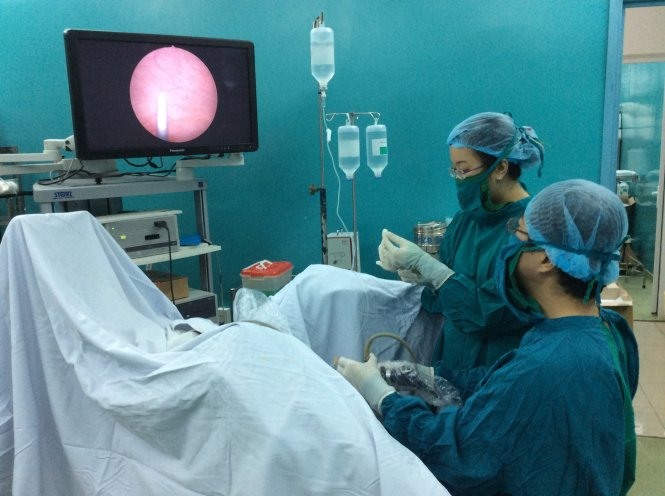.jpg)
.jpg)
You probably can recall, with some tangible discomfort, the last time you feel a strong urge to urinate. What if that need is multiplied to many times a day? Certainly not too great. But it’s not an exaggeration if you heard some patients suffering from overactive bladder syndrome (OAB) whose lives are drastically interfered with are on the verge of mental breakdown.
 |
| Medicines are injected into the bladder’s wall to relax muscles and lessen contractions, reducing the sudden urges to urinate in patients with overactive bladder - Photo courtesy of Bình Dân Hospital, Hồ Chí Minh City. |
HCM CITY – You can probably recall, with some tangible discomfort, the last time you felt a strong urge to urinate. Imagine that urge nonstop. Welcome to overactive bladder syndrome (OAB), a syndrome that can bring you on the verge of mental breakdown.
N.T.A, 23, has been in the throes of OAB for almost two years.
She has gone to many clinics and been diagnosed with a whole range of diseases and received treatments accordingly, yet, her condition has failed to improve.
Recently, she went to Bình Dân Hospital and was told that her condition didn’t respond to medicine, and surgery was indicated.
Life altered
The condition started back in the beginning of last year, when she felt a sharp abdomenal pain as well as a constant need to urinate and an equal inability to pass urine. She soon found herself in emergency care.
Local doctors said she had a urinary tract infection and prescribed some drugs which made her able to urinate again.
But after the prescription ended, the frequency of the need to urinate increased abnormally, up to 30-40 times a day.
Totally devastated, she decided to take a leave from university since she was unable to go to school.
“By last August, I felt the need to urinate a hundred times a day. The need arose every 10-15 minutes. In merely one year, I lost more than 6kg from stress and hopelessness,” she said.
“I went to Bình Dân hospital, where doctors said my condition is called overactive bladder syndrome. The drugs I took only reduced the times I need to urinate back to 25-30 times a day. And then the doctors tried injecting drugs directly into my bladder,” she added.
16 per cent of the population affected
According to Dr. Huỳnh Đoàn Phương Mai, from Bình Dân Hospital’s Department of Female urology, the patient is a prime example of OAB syndrome – wherein bladder dysfunction causes a frequent, sudden and unstoppable need to urinate.
The adult bladder volume’s max capacity reaches about 350-500ml, however, in those who suffer from OAB, just a small amount of urine in the bladder will trigger the need to go to the bathroom which will not otherwise.
Mai said that surveys conducted in the U.S. and European countries revealed that about 16 per cent of the population are affected on some level. In Việt Nam, according to a survey done by Việt Nam Urology & Nephrology Association (VUNA) in 2014, the rate is roughly the same.
While the syndrome itself doesn’t pose any direct risk for the patient’s health, it intrudes in their work, daily activities and social lives. It’s embarrassing, not many are willing to talk about it.
The patients will likely suffer from stress, sleep disorder, heightened anxiety and depression, which will likely exacerbate the situation.
According to Mai, doctors need to do detailed screenings, examinations and imagings in order to find the exact causes for repeated urge to urinate and incontinence (leakage of urine).
Many diseases feature the same sets of symptoms, like urinary tract infections, benign prostatic hyperplasia (in males), neurogenic bladders, prolapsed bladders (in females), urinary tract obstructions, bladder stones or tumors, among others. In these cases, proper medicines will be administered.
If, however, no apparent causes were found, then the diagnosis is idiopathic overactive bladder.
According to Mai, patients need behavioral and lifestyle changes, quitting smoking, caffeine, tea, sodas to lessen bladder contractions.
Kegel exercises, bladder-holding practices, perineal massages to help restore normal contractions are also recommended.
If these measures fail, second and third-line treatment will be available.
Prescription of oral medicines for 4-6 weeks will help to relieve the symptoms – proving effective for 80 per cent of patients.
Medicines can also be injected directly to the bladder’s wall to relax its muscles, improve capacity.
Surgery is amenable to cases where repeated medicine injections still don’t prove any success, the patient’s bladder will be removed and replaced with a new one (neobladder) that is grown out of a piece of patient’s own intestine. – VNS
.jpg)







, MOSTI, YB Tuan Chang Lih Kang Minister of Science, Technology and Innovation (MOSTI), Tuan Fabian Bigar, Secretary General of the Ministry of Digital, and Norman Matthieu Vanhaecke, Group CEO of C)